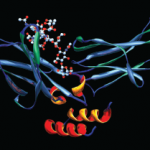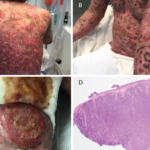 A 2013 meta-analysis revealed an association between psoriasis and cancer in general, and psoriasis and keratinocyte cancer specifically.1 Because lifestyle factors, such as smoking and alcohol consumption, are associated with increased risks for both psoriasis and cancer, some experts have proposed these lifestyle factors may contribute to the increased risk of cancer seen in psoriasis patients.
A 2013 meta-analysis revealed an association between psoriasis and cancer in general, and psoriasis and keratinocyte cancer specifically.1 Because lifestyle factors, such as smoking and alcohol consumption, are associated with increased risks for both psoriasis and cancer, some experts have proposed these lifestyle factors may contribute to the increased risk of cancer seen in psoriasis patients.
Recent research reinforces the finding that psoriasis patients have a slightly increased risk of cancer. Unfortunately, the data on psoriatic arthritis are sparse, making it difficult to draw a conclusion about the risk to that smaller patient population. The findings by Sofie Vaengebjerg, MD, of the University of Copenhagen, Denmark, and colleagues indicate that psoriasis patients are at increased of keratinocyte cancer and lymphomas. Treatment with biologic agents was not associated with an increased risk for cancer, report the investigators in their paper published online in February in JAMA Dermatology.2
The authors assessed 365 studies and included 112 in their systematic review and meta-analysis. These studies comprised more than 2 million patients with psoriasis or psoriatic arthritis. The studies were heterogeneous and varied in their presentation of risk estimates, assessment of psoriasis and cancer, origin of reference populations and length of follow up. Many of the studies were performed in real-world settings and included the use of biologic treatments.
The investigators found an overall prevalence of cancer in psoriasis patients of 4.78%, with an incidence rate of 11.75 per 1,000 person-years. The overall prevalence of keratinocyte cancer in psoriasis patients was 2.55%. When the researchers excluded keratinocyte cancer, they found a cancer prevalence of 4.06% and an incidence rate of 7.61 per 1,000 person-years. The prevalence of lymphomas in psoriasis patients was 0.25% (0.30% for non-Hodgkin’s lymphoma and 0.04% for Hodgkin’s lymphoma), with an incidence rate of 0.39 (0.35 for non-Hodgkin lymphoma and 0.07 for Hodgkin’s lymphoma).
Fourteen studies reported risk estimates of cancer overall or had a reference group. From these, the investigators calculated an overall cancer risk ratio of 1.21. Fifteen studies assessed the risk of keratinocyte cancer, from which the researchers calculated a relative risk of 2.28. When they excluded keratinocyte cancer from overall cancer, the relative risk decreased to 1.14. When the investigators performed a sensitivity analysis, they found the studies of high quality showed no association between psoriasis and overall cancer when excluding keratinocyte cancer.
Nine studies found a significantly increased risk of lymphomas in psoriasis patients, and six found no association. The investigators calculated a risk ratio of 1.56 for lymphomas (Hodgkin and non-Hodgkin). They also calculated a risk ratio of 1.26 for lung cancer based on 14 studies, seven of which showed a significant association between psoriasis and lung cancer.

